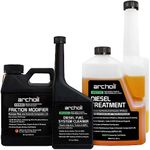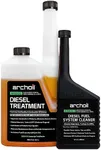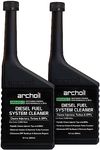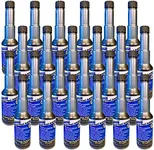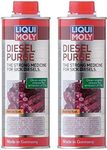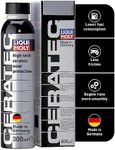Buying Guide for the Best Diesel Oil Additives
Choosing the right diesel oil additive can help improve your engine's performance, extend its life, and keep it running smoothly. With so many options available, it's important to understand what each additive does and how it matches your vehicle's needs. Start by considering your engine's age, how you use your vehicle (like city driving, towing, or long highway trips), and any specific issues you want to address, such as fuel economy, engine noise, or emissions. Always check your vehicle's manual for any recommendations or restrictions before adding anything to your oil.Detergent and Cleaning AgentsDetergents and cleaning agents in diesel oil additives help remove and prevent the buildup of sludge, varnish, and deposits inside your engine. This is important because a clean engine runs more efficiently and is less likely to suffer from wear or damage. Additives with strong cleaning properties are especially useful for older engines or vehicles that have not had regular maintenance. If your engine is newer or you change oil frequently, you may not need as strong a cleaning additive, but for high-mileage or neglected engines, a more robust cleaner can help restore performance.
Anti-Wear AgentsAnti-wear agents are chemicals that form a protective layer on engine parts, reducing friction and wear. This is crucial for extending the life of your engine, especially if you drive in tough conditions like heavy towing or extreme temperatures. If you use your vehicle for heavy-duty work or notice increased engine noise, choosing an additive with strong anti-wear properties can help protect your engine. For light, everyday driving, a standard level of anti-wear protection is usually sufficient.
Viscosity ImproversViscosity improvers help your engine oil maintain the right thickness (viscosity) across a range of temperatures. This is important because oil that is too thin in hot weather or too thick in cold weather can lead to poor lubrication and engine damage. If you live in an area with extreme temperatures or do a lot of cold starts, look for additives that help stabilize oil viscosity. For moderate climates and regular driving, you may not need as much viscosity improvement.
Corrosion and Rust InhibitorsCorrosion and rust inhibitors protect metal engine parts from moisture and chemical reactions that can cause rust and corrosion. This is especially important if your vehicle sits unused for long periods or operates in humid or salty environments. If you store your vehicle for the winter or live near the ocean, an additive with strong corrosion protection is a good choice. For daily drivers in dry climates, basic protection is usually enough.
Cetane BoostersCetane boosters help diesel fuel ignite more easily and burn more completely, which can improve engine performance, reduce noise, and lower emissions. This is particularly useful for older engines or if you notice hard starting, rough idling, or excessive smoke. If your engine runs smoothly and you use high-quality diesel fuel, you may not need a cetane booster, but for performance improvements or problem-solving, it can be beneficial.
Emissions ReducersEmissions reducers are additives designed to lower the amount of harmful exhaust gases your engine produces. This is important for meeting environmental regulations and keeping your vehicle running clean. If you are concerned about emissions, live in an area with strict regulations, or your vehicle is failing emissions tests, look for additives that specifically target emissions reduction. For newer vehicles with advanced emissions systems, this may be less of a concern.
